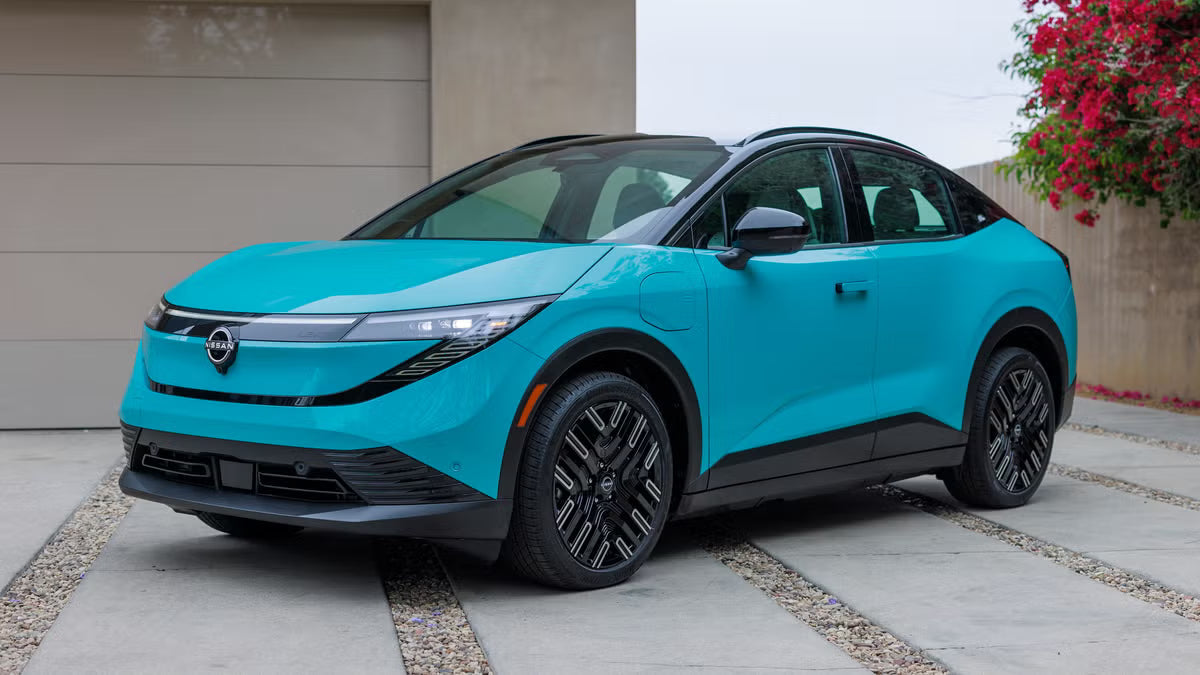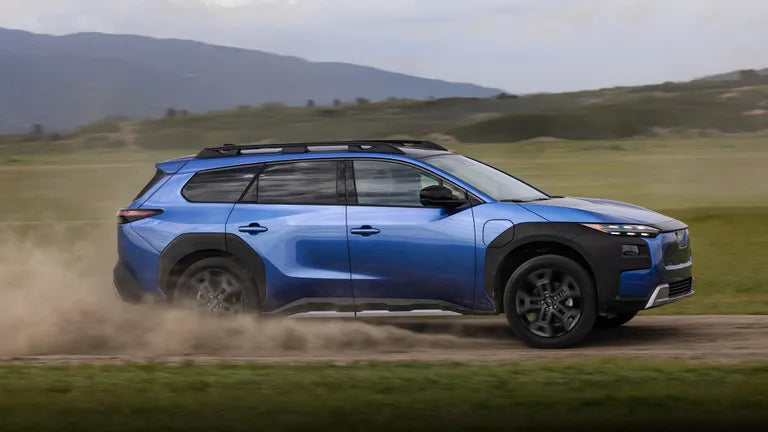Nach zweijähriger Pause kehrt der Chevrolet Bolt 2027 zurück – günstiger, schneller ladbar und smarter denn je. Doch er ist nicht allein im Kampf um günstige Elektroautos. Auch der Nissan Leaf 2026 ist zurück – komplett neu gestaltet für die dritte Generation und bereit zu beweisen, dass er weiterhin zur Debatte steht.
Beide Modelle sind derzeit ab etwa 30.000 US-Dollar erhältlich und damit die günstigsten neuen Elektrofahrzeuge in Amerika – mindestens 3.000 US-Dollar günstiger als die nächstgünstigere Option, der Chevrolet Equinox EV. Welches Modell ist also Ihr Geld wert?

Preise und Verfügbarkeit
Der Chevy Bolt 2027 ist ab 29.990 US-Dollar (einschließlich Zielort) erhältlich und kommt Anfang 2026 auf den Markt. Eine abgespeckte LT-Ausstattung folgt später für nur 28.995 US-Dollar .
Der Nissan Leaf S+ (Modelljahr 2026) ist derzeit ab 31.485 US-Dollar erhältlich. Nissan plant jedoch, eine noch günstigere Basisausstattung „S“ mit kleinerer Batterie und geringerer Reichweite anzubieten. Sobald dies geschieht, könnte der Leaf den Bolt unterbieten – doch derzeit hält GM den Titel des günstigsten Elektroautos in Amerika .
Design & Plattform
Auf den ersten Blick sieht der neue Bolt vertraut aus, da sein Äußeres größtenteils vom vorherigen Bolt EUV übernommen wurde, dessen Produktion 2023 eingestellt wurde. Aber unter der Oberfläche ist es praktisch ein neues Auto, mit einer neuen Batterie, einem schnelleren Ladesystem, einem verbesserten Motor und einer überarbeiteten Kabine .
Im Gegensatz dazu hat der Leaf eine komplette Transformation durchlaufen. Der Leaf der dritten Generation basiert auf einer brandneuen Plattform und bietet mehr Reichweite, Leistung und Geschwindigkeit bei gleichzeitig klarerem, modernerem Aussehen.
Lade- und Stromversorgungsfunktionen
Beide Fahrzeuge verfügen nun über NACS-Anschlüsse , sodass Besitzer Tesla-Supercharger ohne Adapter anschließen können. Für die Nutzung von Nicht-NACS-Ladegeräten wie Electrify America benötigen Sie jedoch einen separaten Adapter.
Interessanterweise verfügt der Leaf über einen zweiten J1772-Anschluss nur zum AC-Laden – eine ungewöhnliche, aber flexible Konfiguration.
Der Bolt bietet Vehicle-to-Home-Funktion (V2H) und versorgt Ihr Haus bei Stromausfällen mit Strom. Der Leaf unterstützt Vehicle-to-Load-Funktion (V2L) zur Stromversorgung kleinerer Geräte oder Werkzeuge über einen Adapter.
Beide laden mit bis zu 150 kW an Gleichstrom-Schnellladegeräten, aber das integrierte Wechselstrom-Ladegerät des Bolt mit 11,5 kW übertrifft das 7,2-kW-System des Leaf, was ein schnelleres Laden über Nacht zu Hause bedeutet.

Akku & Reichweite
Und hier übernimmt Nissan die Führung. Der Leaf S+ bietet mit seiner 75-kWh-Lithium-Ionen-Batterie eine Reichweite von bis zu 303 Meilen und kann in etwa 35 Minuten von 10 % auf 80 % aufgeladen werden.
Die kleinere 65-kWh-LFP-Batterie des Bolt bietet eine Reichweite von 400 Kilometern , gleicht dies aber durch eine schnellere 10-80-Prozent-Ladung in 26 Minuten aus. Der Bolt verfügt außerdem serienmäßig über eine Wärmepumpe , während sie beim Leaf nur in höheren Ausstattungsvarianten enthalten ist.
Leistung
Beide Elektrofahrzeuge verfügen über Frontantrieb und obwohl keines von beiden für Rennen gebaut ist, sind sie für den täglichen Gebrauch spritzig genug.
-
Bolt: 210 PS, 250 Nm Drehmoment
-
Leaf: 214 PS, 261 lb-ft Drehmoment
Trotz des geringeren Drehmoments trägt die leichtere Karosserie des Bolt (3.766 lbs gegenüber über 4.200 lbs des Leaf) zu einer ausgewogenen Leistung bei.
Interieur, Technik & Raum
Im Innenraum bieten beide Autos ein Maximum an Platz und Funktionalität. Der Bolt bietet etwas mehr Platz für die Passagiere , während der Leaf beim Laderaum die Nase vorn hat.
Der Bolt verfügt über ein 11-Zoll-Digital-Cluster und ein 11,3-Zoll-Infotainment-Display mit integriertem Google – aber ohne Apple CarPlay oder Android Auto.
Der Leaf wehrt sich mit zwei 12,3-Zoll-Displays , kabellosem CarPlay und Android Auto sowie in den höheren Ausstattungsvarianten sogar mit einem Google-basierten System . Für viele könnte allein die CarPlay-Unterstützung ein Ausschlusskriterium sein.
Sicherheit und Fahrerassistenz
Der Leaf ist standardmäßig mit dem Safety Shield 360- Paket von Nissan ausgestattet, das automatische Notbremsung, Spurverlassensvermeidung und ProPILOT Assist für halbautonomes Fahren auf der Autobahn umfasst.
Der Bolt kontert mit seiner eigenen beeindruckenden Ausstattung: Adaptive Geschwindigkeitsregelung, Toter-Winkel-Lenkassistent, Spurhalteassistent und Kreuzungs-Notbremsassistent. Beide Autos sind vollgepackt mit Funktionen, die man von teureren Elektrofahrzeugen erwarten würde.

Fazit: Zwei günstige Elektroautos, die wirklich Sinn machen
Da es keine bundesstaatlichen Steuergutschriften für Elektrofahrzeuge mehr gibt , braucht Amerika dringend bezahlbare Elektroautos – und diese beiden erfüllen diese Anforderungen.
Der Bolt hat die Nase vorn, da er günstiger ist, zu Hause schneller aufgeladen werden kann und mehr Platz für die Passagiere bietet. Der Leaf hingegen bietet eine größere Reichweite, ein höheres Drehmoment und die Integration von Apple CarPlay.
Letztendlich sind beides intelligente, geldbeutelfreundliche Elektrofahrzeuge, die Elektromobilität für die breite Masse zugänglich machen. Ihre Wahl hängt möglicherweise von Ihren Prioritäten ab – Reichweite und Ausstattung (Leaf) oder Wert und Zweckmäßigkeit (Bolt) .
Vergleich: Chevrolet Bolt 2027 vs. Nissan Leaf 2026
| Spezifikation | Chevrolet Bolt (2027) | Nissan Leaf (2026) |
|---|---|---|
| Startpreis (mit Zielort) | 28.995 USD | 31.485 USD |
| Driving Range | 255 Meilen (GM-geschätzt) | 259–303 Meilen (EPA-Schätzung) |
| Batteriekapazität | 65 kWh | 75 kWh |
| Maximales Laden (DC) | 150 kW | 150 kW |
| Max. Ladung (AC) | 11,5 kW | 7,2 kW |
| 10–80 % Schnellladung | 26 Minuten | 35 Minuten |
| Wärmepumpe | Standard | Optional (nicht Basis) |
| Leistung | 210 PS | 214 PS |
| Drehmoment | 169 lb-ft | 261 lb-ft |
| Länge | 169,6 Zoll | 173,4 Zoll |
| Breite | 69,7 Zoll | 71,3 Zoll |
| Höhe | 63,9 Zoll | 61,3 Zoll |
| Radstand | 105,3 Zoll | 105,9 Zoll |
| Gewicht | 3.766 Pfund | 4.206–4.393 Pfund |
| Fracht (Sitze hochgeklappt) | 16,2 Kubikfuß | 20 Kubikfuß |
| Fracht (Sitze umgeklappt) | 56,3 Kubikfuß | 55,5 Kubikfuß |
| Kopffreiheit vorne | 39,1–40 Zoll | 39,9 Zoll |
| Beinfreiheit vorn | 44,3 Zoll | 42,4 Zoll |
| Kopffreiheit hinten | 37,8 Zoll | 36,6–37,2 Zoll |
| Beinfreiheit im Fond | 39,1 Zoll | 31,8 Zoll |
Empfohlene Lektüre: 2026 Tesla Model Y vs. 2025 Ford Mustang Mach-E: EV-Rivalen treten erneut gegeneinander an








Aktie:
2027 Chevy Bolt erhält schnelleres Laden und niedrigeren Preis
Top-Elektrofahrzeuge, die im Oktober 2025 in Betracht gezogen werden sollten (US-Markt)